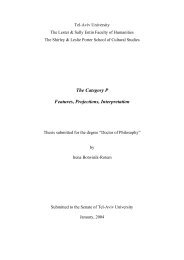How to Avoid a New Financial Crisis
How to Avoid a New Financial Crisis
How to Avoid a New Financial Crisis
You also want an ePaper? Increase the reach of your titles
YUMPU automatically turns print PDFs into web optimized ePapers that Google loves.
intervene. Finally, when it comes <strong>to</strong> raising interest rates the winners and losers are widespread.<br />
While banks generally lose out, there are other financial institutions that may benefit.<br />
None of these conditions apply <strong>to</strong> banking crises. First, banking crises are a relatively<br />
rare phenomenon (roughly every 7 <strong>to</strong> 10 years). In the United States, an administration is almost<br />
guaranteed not <strong>to</strong> be around <strong>to</strong> face the next one. Even a central banker is unlikely <strong>to</strong> face it<br />
twice. Thus, there are no personal incentives <strong>to</strong> build credibility. Quite the contrary, all the<br />
incentives are in the direction of “never on my watch”. No central bank governor wants <strong>to</strong> go<br />
down in his<strong>to</strong>ry as the one thought <strong>to</strong> be responsible for a major bank crisis.<br />
Second, when it comes <strong>to</strong> financial crises, a government does not have the luxury of<br />
small incremental steps. It can make only big decisions: save Lehman or not, save AIG or not,<br />
etc. This discreteness increases the political cost of making a decision that, while good in the<br />
long-term, has significant costs in the short-term.<br />
The third difference is that the economic costs of not intervening are very concentrated.<br />
Dick Fuld alone lost a billion dollars from the collapse of Lehman. It is hard <strong>to</strong> imagine a single<br />
individual losing that amount of money from any individual monetary policy decision. When the<br />
gains are so concentrated, lobbying is much more intense (even though in Fuld’s case it didn’t<br />
work).<br />
Last but not least, committing never <strong>to</strong> bail out a large financial institution may be going<br />
<strong>to</strong>o far. The economic costs of not intervening may be huge and a well organized intervention<br />
can create a lot of short-term value, at the expenses of more risk and pain down the road. A<br />
recent paper shows that, even ignoring the potentially large positive systemic effects, the U.S.<br />
government intervention <strong>to</strong> rescue the financial industry in Oc<strong>to</strong>ber 2008 increased the value of<br />
the nine largest financial institutions by $131 billion at a taxpayers’ cost of $25 -$47 billion, with<br />
a net benefit of between $84bn and $106bn. 6 Why? Because during a financial crisis asset prices<br />
become excessively depressed and an intervention <strong>to</strong> avoid liquidation can have a large<br />
economic payoff for the parties involved. Given this, perhaps a person in power, whether she is a<br />
politician or a political appointee, has some justification in not resisting a rescue.<br />
6 Veronesi, P. and L. Zingales, 2009, “Paulson’s Gift”, NBER working paper.<br />
4
















